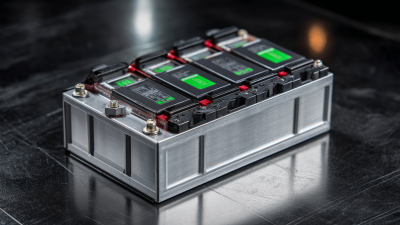Ultimate Guide to Choosing the Right Solar Lithium Battery for Your Energy Needs
Table of Contents
- Understanding Solar Lithium Batteries: Key Features and Benefits
- Determining Your Energy Needs: How to Assess Battery Capacity
- Types of Solar Lithium Batteries: Exploring Different Options
- Factors to Consider When Choosing the Right Battery
- Cost Analysis: Budgeting for Your Solar Lithium Battery Purchase
- Installation and Maintenance Tips for Longevity and Efficiency
- FAQS
- Conclusion
- Related Posts
As the global shift towards renewable energy sources accelerates, the demand for efficient energy storage solutions is clearer than ever. Particularly, the Solar Lithium Battery has emerged as a preferred choice among homeowners and businesses alike, driven by its superior performance, longevity, and environmental benefits. According to a recent report by Bloomberg New Energy Finance, the lithium-ion battery market is expected to reach $100 billion by 2028, highlighting the increasing reliance on energy storage systems. With over 27 years of expertise in the R&D, manufacturing, and solution services for lithium batteries, Roofer Electronics Technology (Shanwei) Co., Ltd. stands at the forefront of this evolution, offering cutting-edge products and services tailored for various applications, from household energy storage to electric bicycles. In this ultimate guide, we will explore key considerations to help you choose the right Solar Lithium Battery to meet your energy needs effectively.

Understanding Solar Lithium Batteries: Key Features and Benefits
When considering solar lithium batteries, it’s essential to understand their key features and benefits, especially in the context of our rapidly evolving energy landscape. Lithium-ion batteries have emerged as crucial components for energy storage, enabling users to harness solar energy efficiently. These batteries are known for their high energy density, long life cycles, and increased charging speed, making them ideal for both residential and commercial applications. The continuous advancements in battery technology, including improvements in electrode materials and electrolytes, enhance their performance and sustainability.

Moreover, the integration of battery management systems plays a significant role in maximizing the functionality and longevity of solar lithium batteries. By intelligently regulating charging and discharging cycles, these systems ensure optimal performance and safety. With the global push towards decarbonization, understanding the intricate mechanics behind these systems becomes vital for consumers looking to invest in reliable energy storage solutions. As the market grows, choosing the right solar lithium battery tailored to individual energy needs can offer not only economic benefits but also contribute to a cleaner, greener future.
Determining Your Energy Needs: How to Assess Battery Capacity
When choosing the right solar lithium battery, understanding your energy needs is crucial. Start by calculating your daily energy consumption, which involves accounting for all the devices and appliances you plan to power. Look at the wattage of each device and how many hours you use them throughout the day. This will help you determine the total watt-hours needed, guiding your selection of battery capacity. It's also important to consider the type of activities you engage in; for example, frequency and duration of use will affect your battery requirements as well.
Recent studies highlight that energy consumption patterns are rapidly evolving, especially with the rise of electric vehicles (EVs) and their associated battery technologies. For instance, the integration of modeling frameworks to estimate energy consumption of battery-driven electric buses illustrates the importance of precision in these estimates. Furthermore, as the demand for electric vehicles grows, so does the need for effective energy storage solutions. This is where understanding the lifecycle of the batteries, their production energy consumption, and sustainability challenges come into play. By conducting a thorough assessment of your energy needs and how they align with these industry trends, you can make a more informed choice that supports both your energy independence and sustainable practices.
Types of Solar Lithium Batteries: Exploring Different Options
When exploring the various types of solar lithium batteries, it's essential to consider both conventional lithium-ion options and emerging alternatives. Lithium-ion batteries are widely recognized for their high energy density and efficiency, making them a staple in solar energy storage solutions. However, their production is fraught with environmental concerns, including substantial energy and water usage, alongside challenges in recycling efforts. According to recent studies, the environmental impact of lithium mining can be significant, prompting a search for more sustainable battery technologies.

Furthermore, exciting advancements in dual energy storage systems could revolutionize energy management in electric vehicles and residential solar applications by integrating various storage technologies. Such approaches may offer a more sustainable solution, effectively addressing both performance and environmental challenges. As the energy landscape continues to evolve, understanding the range of battery options available becomes crucial for making informed choices that align with clean energy goals.
Factors to Consider When Choosing the Right Battery
When choosing the right solar lithium battery, there are several key factors to consider to ensure that your energy needs are met efficiently. Firstly, capacity is crucial; it determines how much energy the battery can store and is usually measured in kilowatt-hours (kWh). For instance, a household that consumes about 30 kWh per day should look for batteries with at least 10 kWh capacity to accommodate regular usage without depletion. Additionally, cycle life, which indicates how many charge/discharge cycles a battery can undergo before its capacity significantly diminishes, is an essential consideration. Generally, a higher cycle life translates to longer battery longevity and better overall investment.
Tip: Always assess your energy consumption patterns before choosing a battery. Doing so helps identify the right capacity and ensures that you select a product that can support your lifestyle while saving on energy costs.
Another critical factor is the charge and discharge rates. These rates influence how quickly the battery can be charged during the day and how much energy it can supply during peak demand times. A battery with higher rates will perform better in scenarios where quick recharges are necessary, especially during days of sporadic sunlight. Lastly, consider compatibility with other systems, such as inverters and home energy management systems, to ensure seamless integration.
Tip: Opt for batteries that offer smart features for monitoring performance and energy usage. This can enhance your understanding of your energy consumption and optimize your savings.
Cost Analysis: Budgeting for Your Solar Lithium Battery Purchase
When considering the purchase of a solar lithium battery, it's essential to conduct a thorough cost analysis to suit your energy needs. With the average cost of a home solar panel system around $30,000, potential buyers must evaluate their budget carefully. Tax credits and incentives can significantly lower the net cost, making it crucial to understand available financial support when integrating lithium batteries into your solar system.
The growing market for battery cell components is another factor to consider; the sector, which includes critical elements such as cathodes, anodes, and electrolytes, is projected to grow by 19% in Europe and North America. This growth not only reflects the increasing demand for energy storage solutions but also the need for efficient production practices. Additionally, adopting residential solar photovoltaic systems paired with battery energy storage can be economically enhanced through various policy options, encouraging homeowners to embrace renewable energy while maximizing financial benefits. Understanding these dynamics can greatly influence the overall investment in solar technology.
Installation and Maintenance Tips for Longevity and Efficiency
When it comes to the longevity and efficiency of your solar lithium battery, proper installation is critical. According to a report by the National Renewable Energy Laboratory, incorrect installation can reduce a battery’s lifespan by as much as 30%. To ensure optimal performance, it’s essential to follow manufacturer guidelines closely. Make sure to install the battery in a cool, dry location where temperatures remain between 20-25°C (68-77°F). High temperatures can lead to accelerated degradation, while too low temperatures can compromise performance.
Regular maintenance is also vital for maximizing the efficiency of your solar lithium battery. A study published by the U.S. Department of Energy indicates that periodic checks on battery health can enhance performance by up to 15%. This includes monitoring the state of charge and ensuring that connections are secure and free from corrosion. Additionally, balancing the battery cells periodically promotes longer life and efficient operation. By addressing these aspects, you can enjoy the full benefits of your solar energy system and significantly extend the life of your lithium battery investment.
Ultimate Guide to Choosing the Right Solar Lithium Battery for Your Energy Needs - Installation and Maintenance Tips for Longevity and Efficiency
| Battery Type | Capacity (Ah) | Voltage (V) | Cycle Life | Charging Time (Hours) | Temperature Range (°C) | Weight (kg) | Price (USD) |
|---|---|---|---|---|---|---|---|
| LiFePO4 | 100 | 12 | 2000 | 4 | -20 to 60 | 12 | 800 |
| NMC | 150 | 24 | 3000 | 5 | 0 to 50 | 20 | 1200 |
| NCA | 200 | 48 | 2500 | 6 | -10 to 45 | 25 | 1500 |
| LTO | 80 | 12 | 10000 | 1.5 | -30 to 60 | 30 | 2000 |
FAQS
: Calculate the wattage of all devices and appliances you plan to power and how many hours you use them each day. This will give you the total watt-hours needed, helping you choose the right battery capacity.
There are conventional lithium-ion batteries known for high energy density and efficiency, as well as emerging alternatives such as sodium-ion and aluminum-ion batteries, which aim for a reduced ecological impact.
The production of lithium-ion batteries involves significant energy and water usage and has considerable environmental impacts due to lithium mining, leading to a search for more sustainable battery technologies.
Key factors include capacity (measured in kilowatt-hours), cycle life (how many charge/discharge cycles the battery can handle), charge/discharge rates, and compatibility with other systems like inverters.
Cycle life refers to the number of charge/discharge cycles a battery can undergo before its capacity diminishes significantly. A higher cycle life means longer battery longevity, making it a better investment.
Charge and discharge rates determine how quickly a battery can be charged and how much energy it can supply during peak demand, which is crucial for efficient energy management, especially on days with limited sunlight.
Yes, opting for batteries with smart monitoring features can enhance your understanding of energy consumption and optimize savings by providing insights into performance and usage patterns.
Conclusion
Choosing the right Solar Lithium Battery is crucial for optimizing your energy needs, and understanding the key features and benefits of these batteries is the first step. This guide provides insights into assessing your energy requirements and the various types of solar lithium batteries available, ensuring you select the most suitable option for your specific applications.
Additionally, factors such as budget constraints and installation requirements are discussed to help you make an informed decision. With Roofer Electronics Technology's extensive experience in lithium battery manufacturing and solutions, you can trust in the quality and efficiency of their products, designed for diverse applications including household energy storage and electric bicycles. By following the tips provided, you can enhance the longevity and performance of your solar lithium battery, ensuring a sustainable energy solution.
Related Posts
-

Future Innovations in Best Solar Generating Stations for 2025 a Comprehensive Guide to Next Generation Technologies
-

Advantages of Utilizing Battery Solar Lithium 51.2v Lithium Solar Battery for Sustainable Energy Solutions
-

How to Maximize Efficiency with Your Lithium Ion Battery Pack
-

Understanding the Industry Standards for Best 12v Lithium Iron Battery Production
-

2025 Solar Powered Generator Trends and Comparisons to Watch for in the Industry
-

Leading Global Manufacturer: Explore the Best 3.2v 100ah Lifepo4 Battery Cells Available Today





 business@roofer.cn
business@roofer.cn +86 13502883088
+86 13502883088






